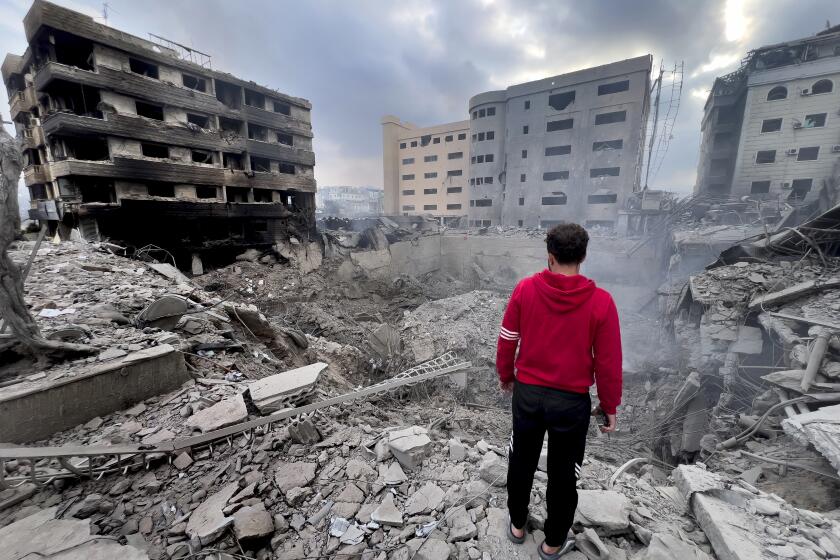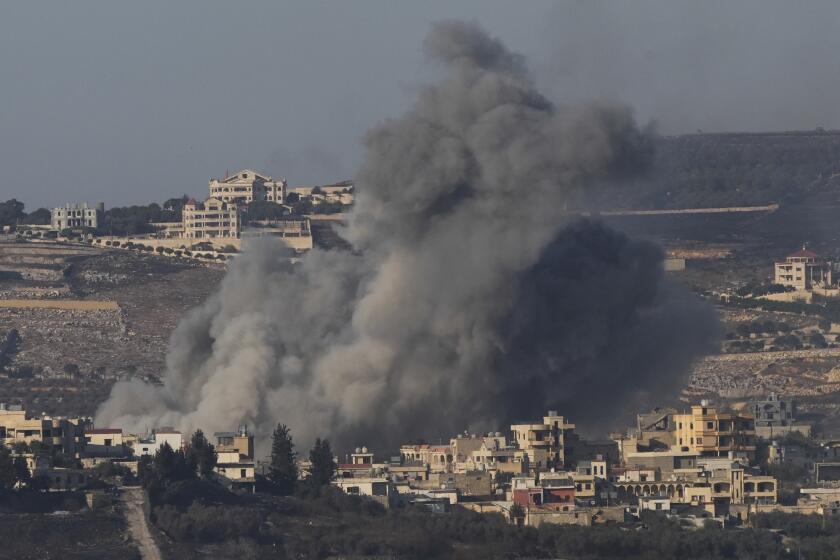Israeli forces kill 2 Lebanese soldiers and injure 2 U.N. peacekeepers; rescuers look for survivors of Beirut strike

BEIRUT — An Israeli airstrike killed two Lebanese soldiers and wounded three on Friday, Lebanon’s military said, just hours after the Israeli military fired on the headquarters of U.N. peacekeepers in southern Lebanon, injuring two of them for the second day in a row.
The incidents entangling both Lebanon’s official army — which has largely stayed on the sidelines of the conflict between Israel and Iran-backed Hezbollah — and the United Nations peacekeeping mission in Lebanon raised alarm as Israel broadens its campaign against Hezbollah with waves of heavy airstrikes across the country and a ground invasion near the border.
In central Beirut, rescue workers Friday combed through the rubble of a collapsed building, searching for survivors of an Israeli airstrike that killed at least 22 people and wounded dozens in the Lebanese capital the night before.
Hezbollah began firing rockets into northern Israel on Oct. 8, 2023, a day after the Gaza-based Hamas militant group attacked southern Israel, killing about 1,200 people and taking some 250 hostages. Hezbollah said its attacks were in solidarity with Palestinians in Gaza and Iran-backed Hamas.
In return, Israel’s military has pounded Hezbollah targets in Lebanon. Israel says its stepped-up campaign since late September aims to push Hezbollah away from the border to allow tens of thousands of Israeli citizens evacuated from the area to return home.
Israel’s attacks have killed more than 2,237 Lebanese — including Hezbollah fighters, civilians and medical personnel — according to the Lebanese Ministry of Public Health. Among them, the ministry reported late Friday, were a 2-year-old and 16-year-old killed by airstrikes in the southern village of Baysarieh.
Hezbollah attacks have killed 29 civilians and 39 Israeli soldiers in northern Israel since October 2023 and in southern Lebanon since Israel launched its ground invasion on Sept. 30, according to Israeli officials.
The war threatens to spiral even further. Netanyahu this week warned the Lebanese that they would suffer the same destruction that Israel’s campaign against Hamas has inflicted in the Gaza Strip unless they take action against Hezbollah. The war in Gaza has killed more than 42,000 people, according to Gaza’s Health Ministry, which doesn’t differentiate between civilians and combatants in its count but says at least half of the dead are women and children.
Israel strikes a Lebanese army checkpoint
On Friday, the Lebanese army said an Israeli airstrike hit a building near a military checkpoint in the southern Bint Jbeil province.
The Israeli military said it had been targeting Hezbollah positions in southern Lebanon when reports emerged that it had hit several Lebanese army soldiers. The Israeli army said it investigated the incident but remained “unaware of any Lebanese army facilities found in the area of the strike.”
Lebanon’s army is not a party to the fighting between Israel and Hezbollah; after Israel launched its ground invasion nearly two weeks ago, Lebanese soldiers withdrew about three miles from their observation posts along the border.
Hezbollah critics and supporters alike are voicing frustration over what many view as the group’s miscalculations.
The only direct clash between the two national armies occurred Oct. 3, when Israeli tank fire hit a Lebanese army post also in the area of Bint Jbeil, killing a soldier and prompting Lebanese soldiers to return fire.
Both Lebanese troops and United Nations peacekeepers are deployed in southern Lebanon to enforce U.N. Security Council Resolution 1701 that ended a bloody monthlong 2006 war between Israel and Hezbollah.
But Lebanon’s army is no match for Hezbollah, and neither its soldiers nor the peacekeepers have been capable of preventing the Shiite militants from entrenching themselves in the border region. Israel accuses Hezbollah of establishing militant infrastructure along the border in violation of the U.N. resolution.
Israel hits U.N. peacekeepers again
The Israeli military opened fire near the U.N. headquarters in Lebanon’s southern town of Naqoura on Friday, the army said, hitting the observation post and injuring two peacekeepers for the second time in as many days.
An initial review by the Israeli army found that soldiers in southern Lebanon targeted what they believed to be a threat some 50 yards from the U.N. peacekeeping mission but ultimately struck the peacekeepers.
One of the injured peacekeepers was hospitalized in the nearby city of Tyre, while the other received medical care on site, according to the United Nations force in Lebanon, known as UNIFIL. Both were identified as Sri Lankan.
The army repeated its warning that UNIFIL personnel abandon their positions in areas where Hezbollah militants launch rockets into Israel. Following Thursday’s attack, the U.N. peacekeeping chief, Jean-Pierre Lacroix, said 300 peacekeepers in front-line positions on southern Lebanon’s border were temporarily moved to larger bases.
Christian villages in southern Lebanon thought their neutrality may spare them from violence in the Israel-Hezbollah conflict. Then the evacuation orders came.
In a statement condemning the strike as “a grave violation of international humanitarian law,” UNIFIL reported that explosions Friday hit the same place they did the day before, when Israeli tank fire injured two Indonesian peacekeepers, damaged vehicles and a communication system, and drew sharp international criticism.
“Peacekeepers must be protected by all parties of the conflict, and what has happened is obviously condemnable,” said U.N. Secretary-General António Guterres.
The French Foreign Ministry accused Israel of deliberately firing at peacekeepers and summoned the Israeli ambassador Friday in an official protest.
In a call with his Israeli counterpart, U.S. Defense Secretary Lloyd J. Austin III stressed the importance of ensuring the safety of UNIFIL forces and urged Israel to “pivot from military operations to a diplomatic pathway as soon as feasible,” the Pentagon said.
When President Biden was questioned by reporters whether he was asking Israel to stop striking U.N. peacekeepers, he replied, “Absolutely, positively.”
UNIFIL, which has more than 10,000 peacekeepers from dozens of countries, was created to oversee the withdrawal of Israeli troops from southern Lebanon after Israel’s 1978 invasion. The U.N. expanded its mission following the 2006 Israel-Hezbollah war, allowing peacekeepers to patrol a buffer zone along the border.
Beirut residents left reeling from Israeli strikes
In the Burj Abi Haidar neighborhood of central Beirut, civil defense workers dug through concrete and twisted metal from a three-story building brought down the day before — the deadliest Israeli air raid to hit the capital over the last year.
Thursday’s airstrikes hit two residential buildings in neighborhoods that have swelled with displaced people fleeing Israeli bombardment elsewhere in Lebanon.
“The world suddenly turned upside down,” recalled Ahmad al-Khatib, a 42-year-old Lebanese postal worker who was with his wife and toddler daughter in his in-laws’ apartment when the bombs fell on the building next door.
Al-Khatib said he had pulled his 2 ½-year-old, Ayla, out from under the debris of a collapsed bedroom wall. The force of the explosion had flung his wife, Marwa Hamdan, against a wall and a piece of metal hit her in the head. She remains in intensive care, he said, tears running down his cheeks.
Hezbollah’s Al Manar TV channel and Israeli media reported that the strikes aimed to kill Wafiq Safa, a top security official with the group, but he was not in either targeted building at the time of the strike. The Israeli military had no comment on the reports.
Another resident, Mohammed Tarhani, said he had moved in with his brother in Burj Abi Haidar after fleeing southern Lebanon to escape airstrikes in recent weeks.
“Where is one supposed to go now?” he asked.
Hezbollah kept up its rocket fire into Israel on Friday, setting off air raid sirens just north of Tel Aviv. Interceptions by Israel’s air defense system scattered rocket fragments in the seaside suburb of Herzliya and sent shrapnel flying into a building there, causing damage but no casualties.
While disrupting life for Israelis, most of Hezbollah’s barrages have not caused casualties. But early Friday, an anti-tank missile fired from Lebanon killed a man from Thailand working on a farm in northern Israel.
Hezbollah’s chief spokesperson vowed the group would expand its attacks into more populated areas deeper inside Israel.
“This is only the beginning,” Mohammed Afif told reporters from a smoldering street left in ruins by Israeli airstrikes in Beirut’s southern suburbs. “I tell the enemy that you have only seen the minimum.”
Mroue writes for the Associated Press.
More to Read
Sign up for Essential California
The most important California stories and recommendations in your inbox every morning.
You may occasionally receive promotional content from the Los Angeles Times.












